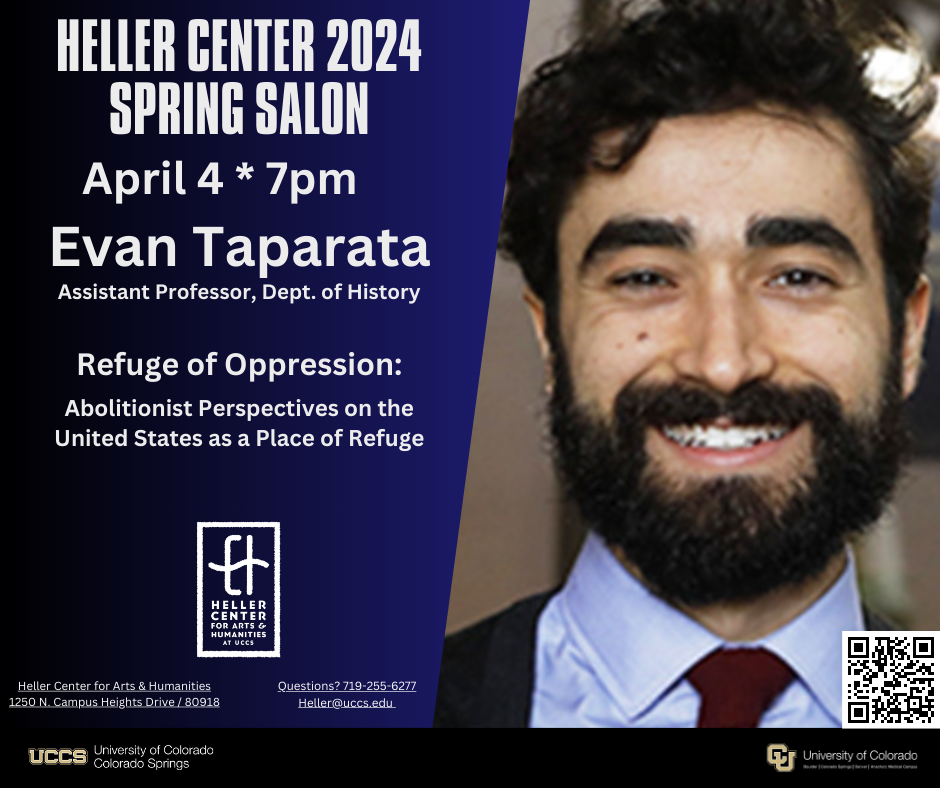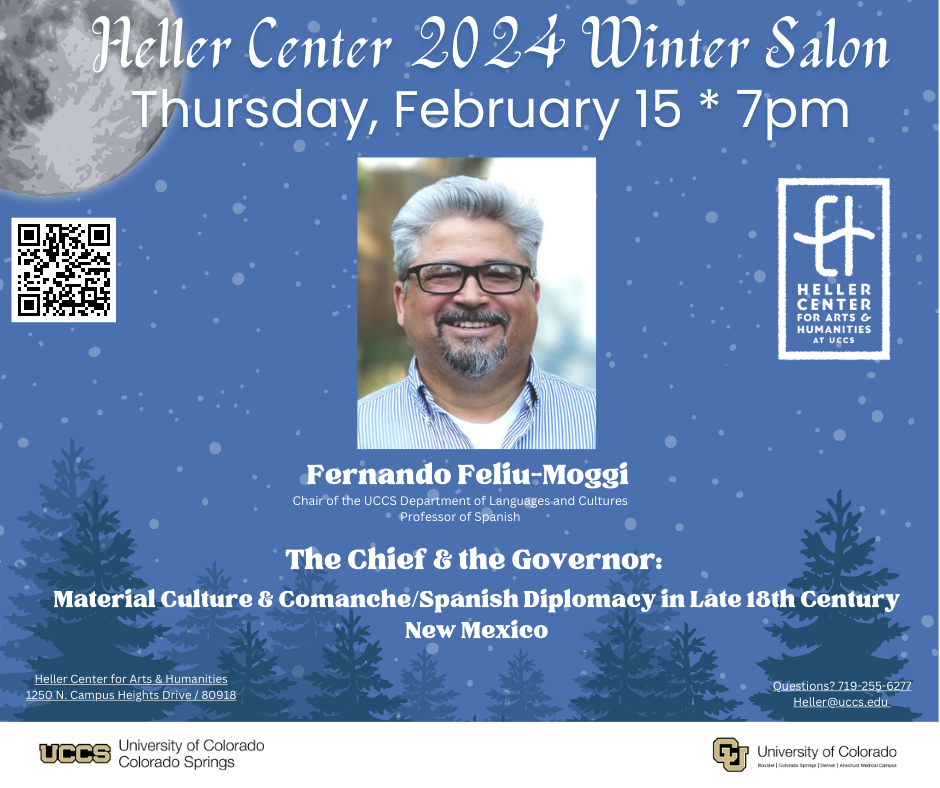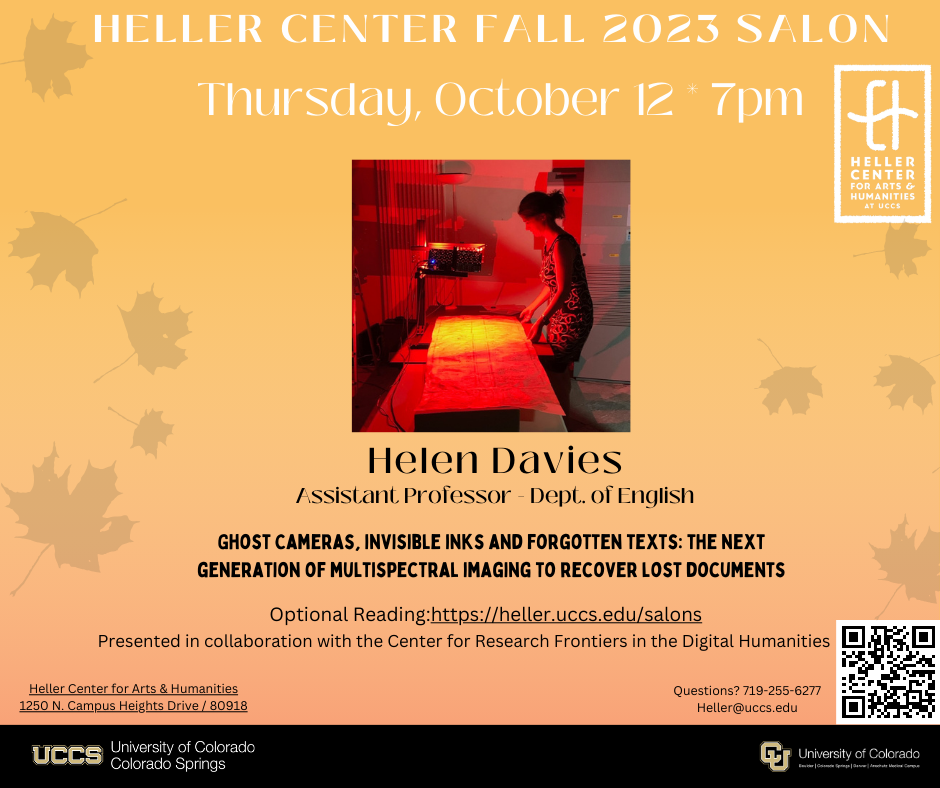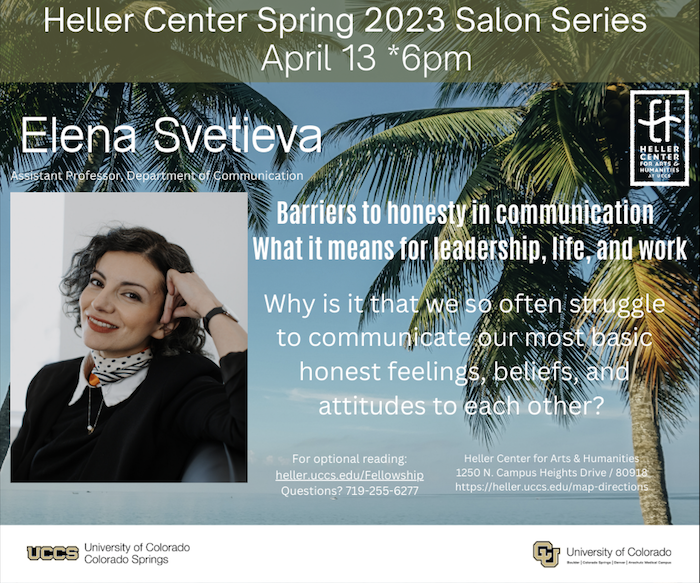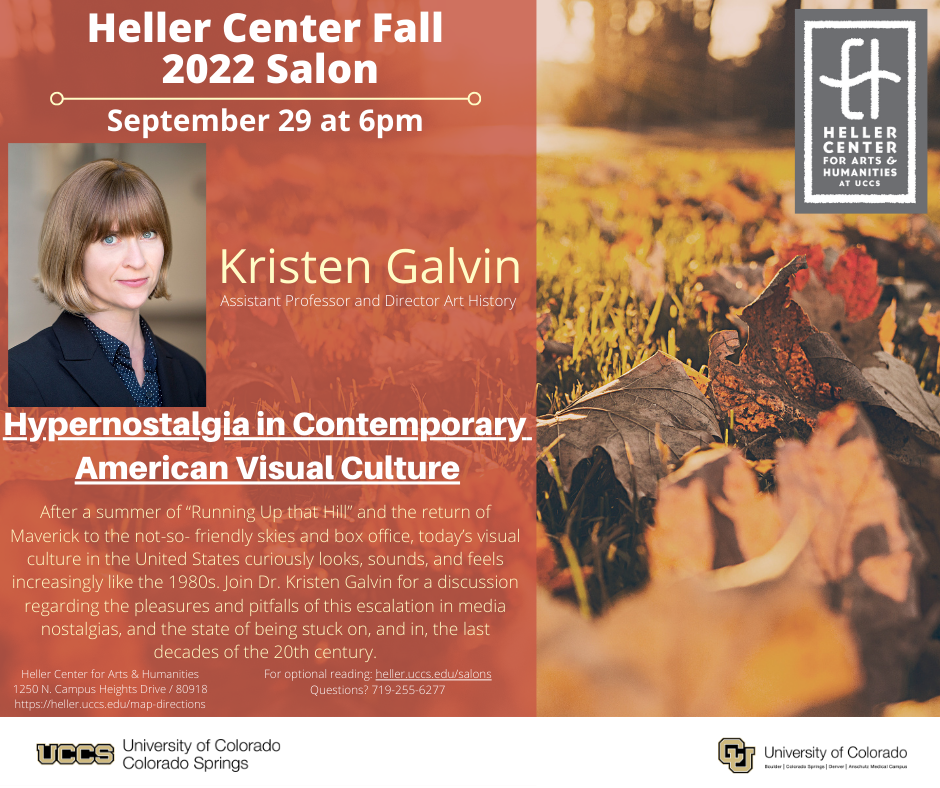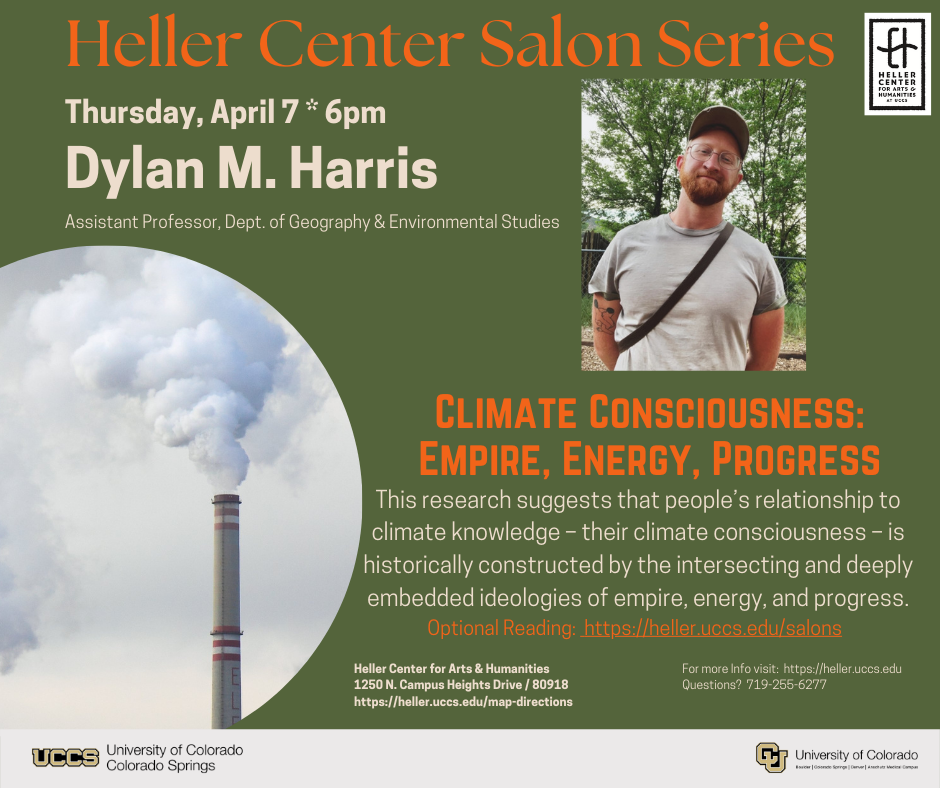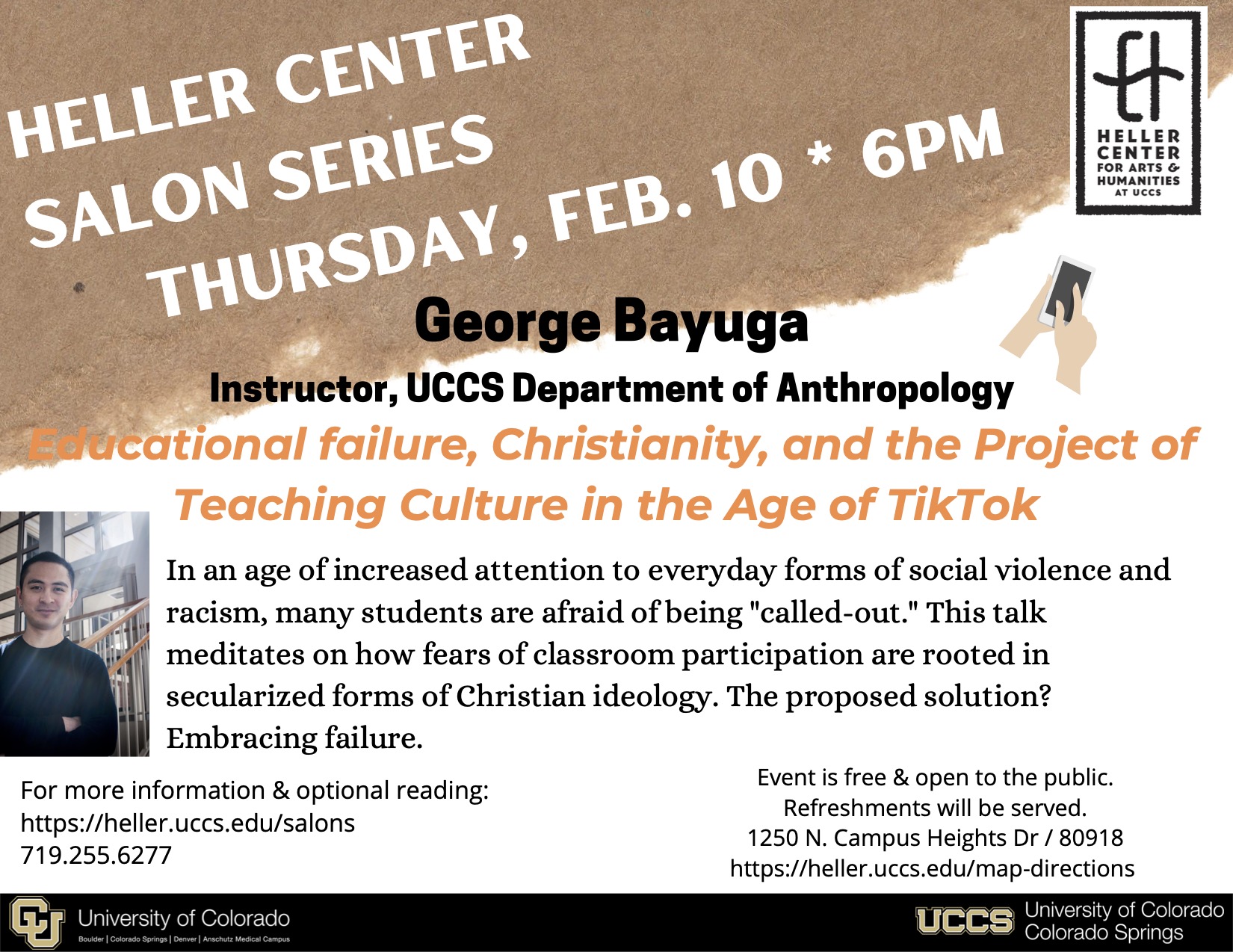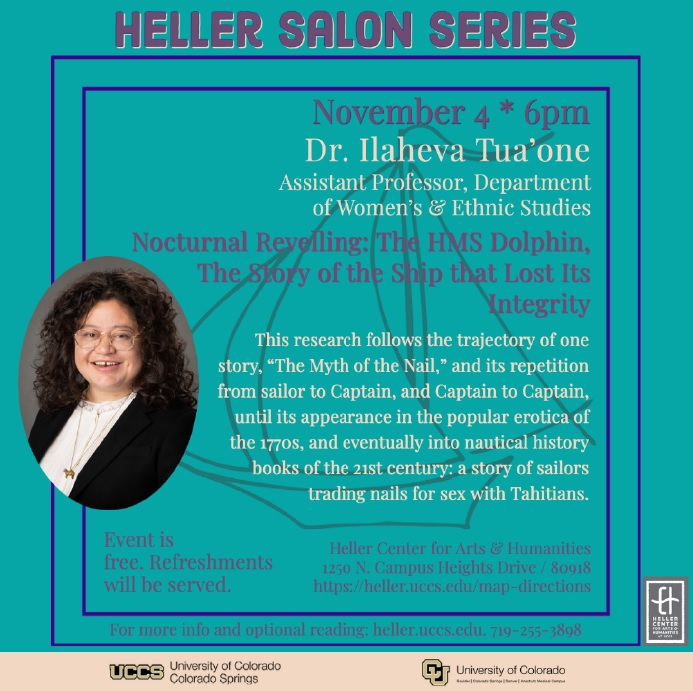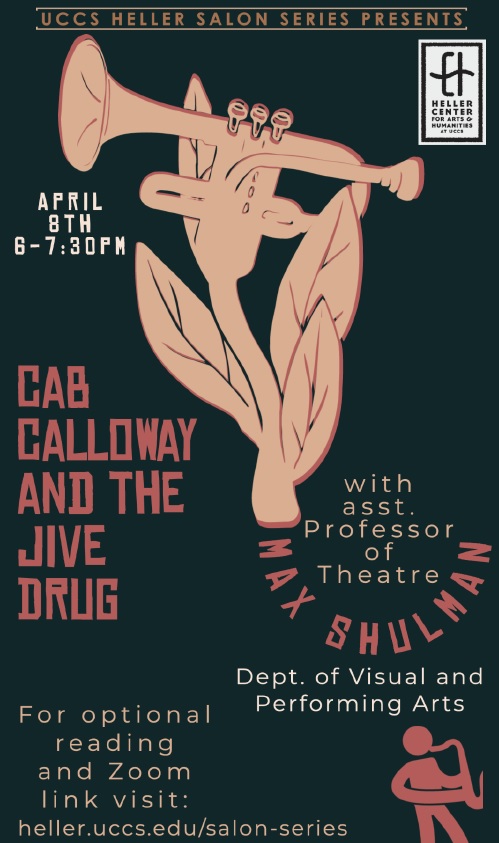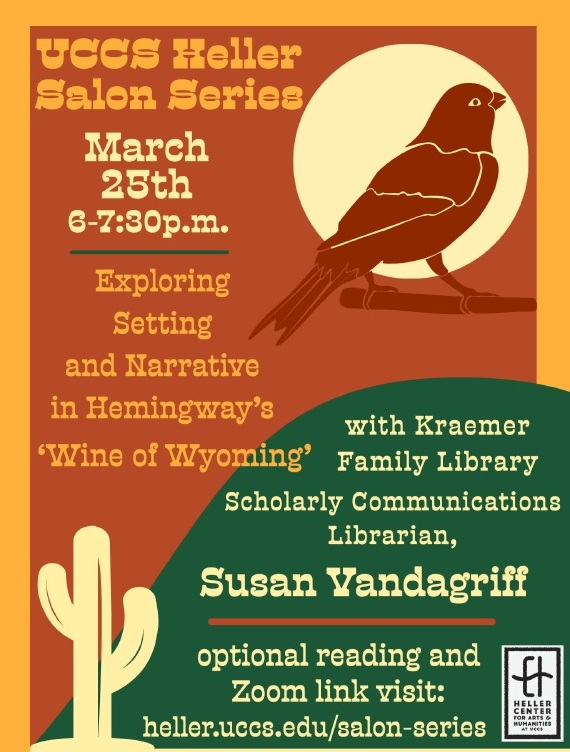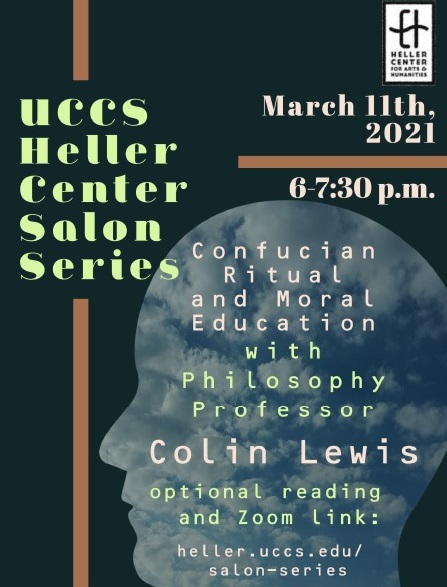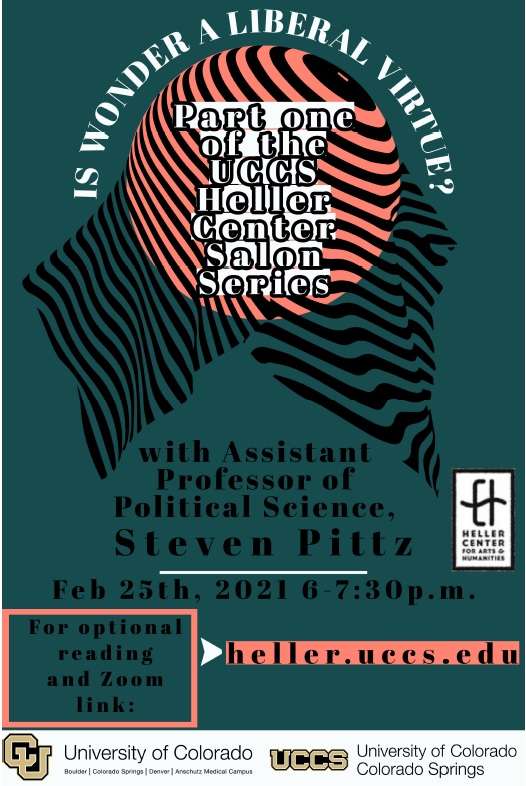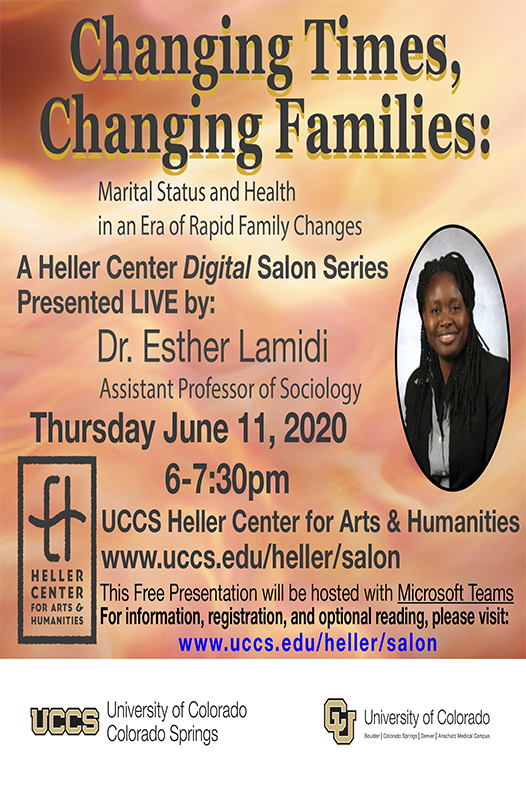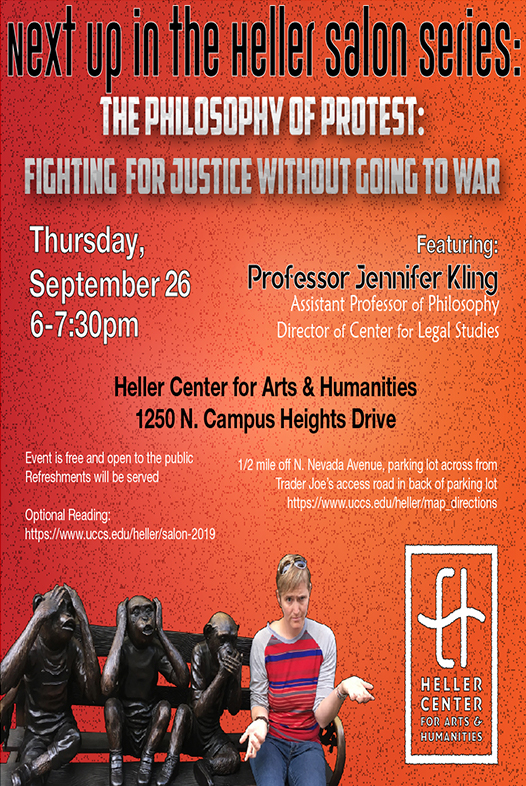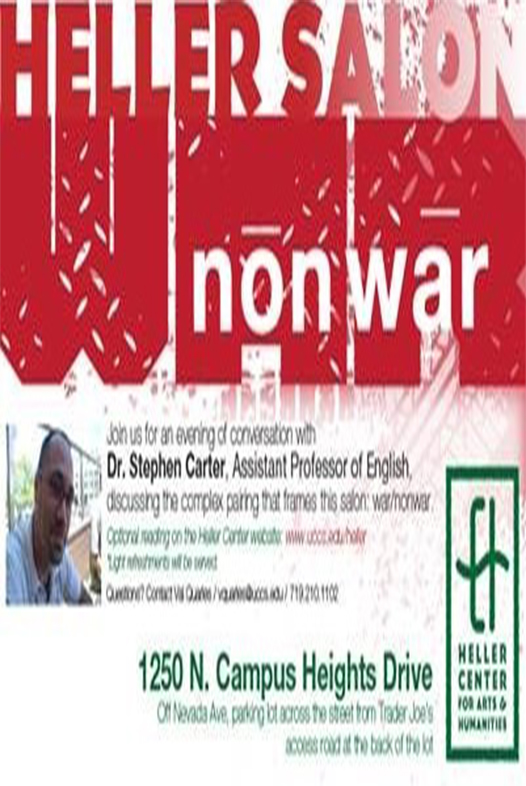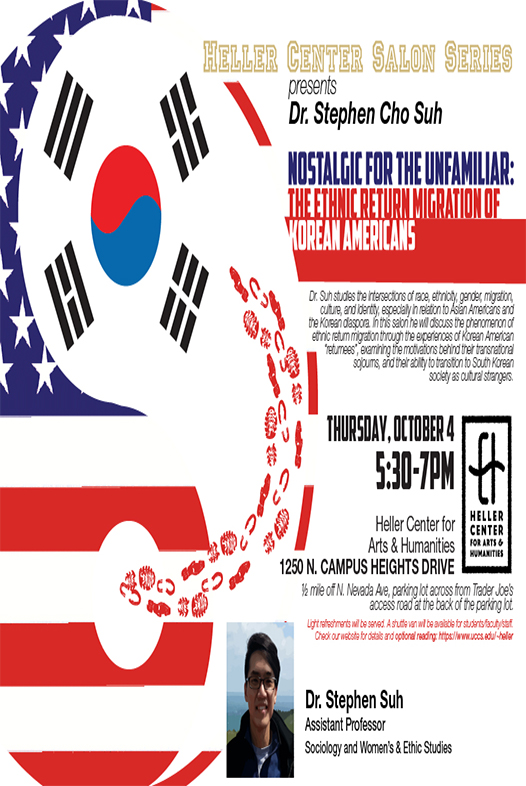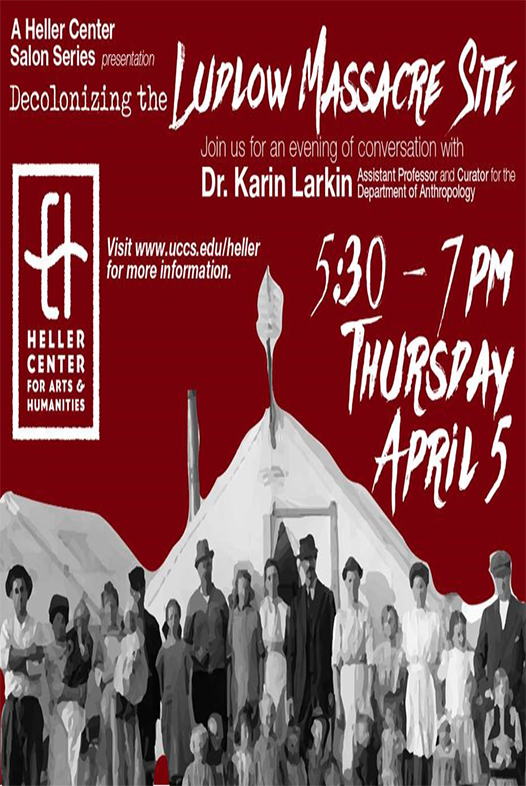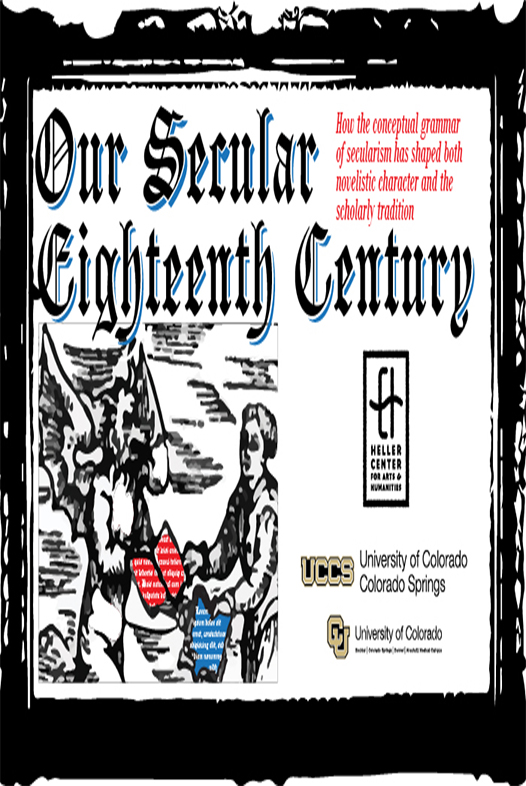Salons
What is a Salon?
Dating back to the literary and philosophical movements of seventeenth- and eighteenth-century France, a salon is “a fashionable assemblage of notables (such as literary figures, artists, or statesmen) held by custom at the home of a prominent person.”At the Heller Center, junior faculty present their research to the campus and wider Colorado Springs community. The audience may choose – or not - to read a pre-posted selection of the professor’s writing before the event. After a brief lecture, the floor opens for questions and conversation – all with wine and cheese.
Heller Center Salon Series
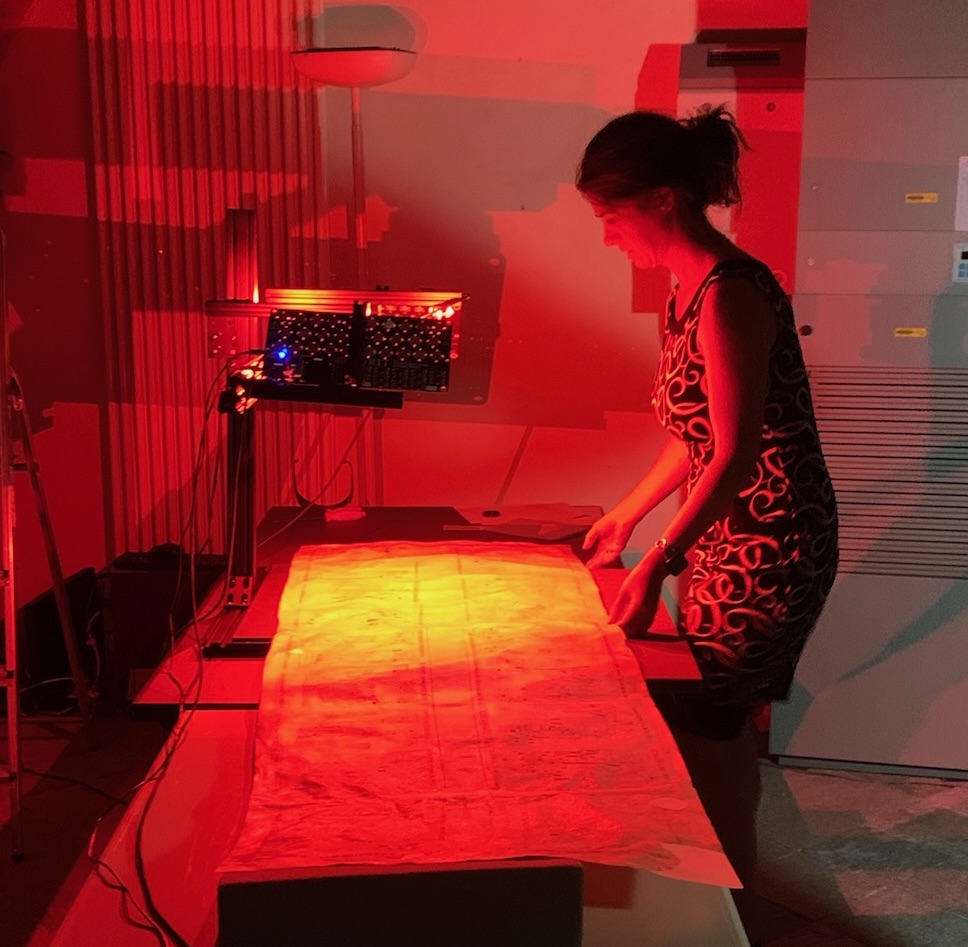
Thursday, October 12 at 7pm
Helen Davies
Assistant Professor, Department English
Ghost Cameras, invisible inks and forgotten texts: the next generation of multispectral imaging to recover lost documents
Unlock the hidden treasures of our past with groundbreaking multispectral imaging techniques designed for affordable and widespread cultural heritage recovery. Dive deep into a world where expanded archives unveil richer histories, bringing once overlooked narratives to the forefront of academic appreciation and value.
Dr. Helen Davies is an assistant professor of the digital humanities in the English Department at UCCS where she also co-directs the Center for Research Frontiers in the Department of English. She trained with and continues to work with the Lazarus Project, a multispectral imaging collaborative. Helen recently started her own MSI cultural heritage recovery project, Videntes. Her recent work can be found in Digital Philology, Dark Archives, and Imago Mundi. She recently published a digital critical edition of the Vercelli Mappa Mundi3500 and has forthcoming work on William Blake, medieval ostriches, maps and digital technology.
My research focuses on the intersection of medieval texts and the digital humanities with a particular emphasis on medieval cartography. I use multispectral imaging to recover cultural heritage objects and again particularly medieval maps. My research addresses the medieval world view, the way narratives affect our sense of space and place, and developing pioneering, low-cost imaging technologies.
Presented in collaboration with the Center for Research Frontiers in the Digital Humanities
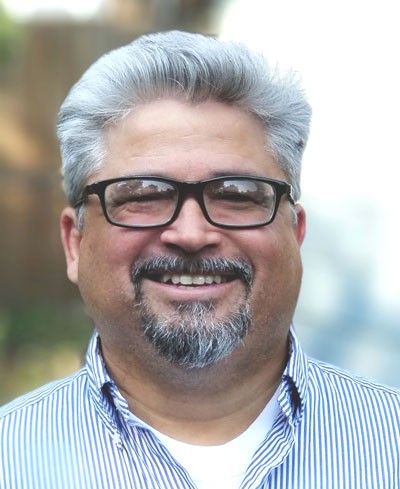
Thursday, February 15, * 7pm
Fernando Feliu-Moggi
Chair of the Department of Languages and Cultures, Professor of Spanish
The Chief and the Governor: Material Culture and Comanche/Spanish Diplomacy in Late 18thCentury New Mexico
Influenced by changing geopolitical dynamics in the region, the peace treaty accorded in Santa Fe by the Spanish and Eastern Comanche in 1786 culminated more than two decades of violent confrontation between the two groups. Objects from this period associated with both cultures illustrate how these transformations affected the way the two populations reimagined their social and political relationship.
Fernando Feliu-Moggi is Professor of Spanish and Chair of the Department of Languages and Cultures at UCCS. He earned a PhD in Hispanic Literatures and Cultural Studies from the University of Pittsburgh in 2004. He has published extensively on Latin American literature and contemporary art and film. As an editor and translator he collaborates regularly with museums and visual arts institutions in the United States, Latin America, and Europe where he has worked on more than 30 exhibition catalogs for, among others, the Museum of Contemporary Art San Diego; the San Francisco Museum of Contemporary Art; Los Angeles; Institute of Contemporary Art, Los Angeles; LA Plaza de la Cultura y Artes, Los Angeles; the Academy Museum of Motion Pictures; the New Museum, New York; Museo Reina Sofia, Madrid, Spain; and the National Library in Guatemala. He has held visiting professorships at Carnegie Mellon University, Pittsburgh, and Bowdoin College, Maine, and taught at the Unversidad de Costa Rica and Universidad Rafael Landivar, Universidad Francisco Marroquín, and Universidad de San Carlos in Guatemala. He is a member of the European Academy of Sciences and Arts and of the Center for Research Frontiers in Digital Humanities at UCCS. He has been at UCCS since 2002.
His academic interests focus on cultural production in Latin America, and the power dynamics of identity articulation in multicultural societies. His studies range from analysis of Latin American literature in the 19th and 20thcenturies (Caliban in the City of Light: Paris in the Latin American Crónica from Sarmiento to the Avant-Garde, Pittsburgh, 2004), contemporary indigenous Latin American Art (Cabrera, Catafixia, Guatemala, 2020, De Rabinal Achi al retorno a Xibalba: Des-cubrimientos poscoloniales en las artes de Guatemala (forthcoming), and the Spanish heritage of the American Southwest.
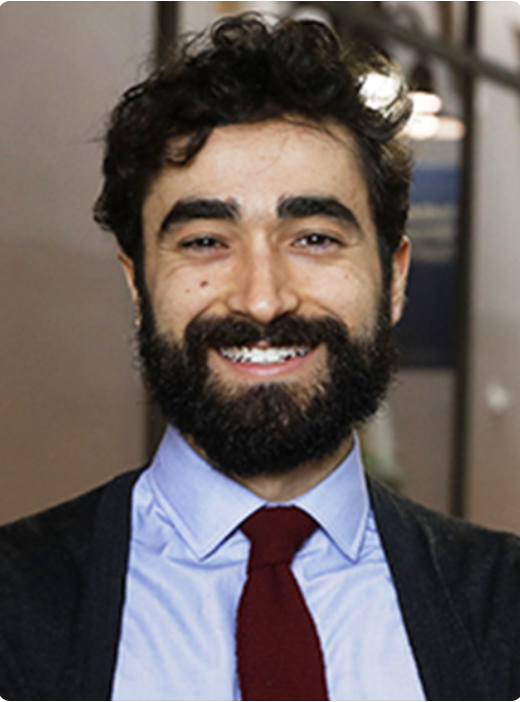
Thursday, April 4 at 7pm
Evan Taparata
Assistant Professor, Dept. of History
“Refuge of Oppression:” Abolitionist Perspectives on the United States as a Place of Refuge
Evan Taparata is an Assistant Professor of the 20th Century History of the United States in the World. His research and teaching interests revolve around migration, belonging, law, and empire in the 19th and 20th century United States. He is a member of the Migration Scholar Collaborative and has contributed to numerous digital public history projects, including the Humanities Action Lab’s “States of Incarceration” initiative and the #ImmigrationSyllabus. His scholarship has been published in the Journal of American Ethnic History, PublicBooks.org, and he has been a regular contributor to PublicRadioInternational.org both as a freelance writer and as the Interim Social Media Editor for PRI’s daily radio broadcast “The World.”
Prior to joining UCCS, Taparata was a 2020-2022 Postdoctoral Fellow in Global American Studies at Harvard University’s Charles Warren Center for Studies in American History, where he taught in the Ethnicity, Migration, and Rights Program. From 2018-2020 he was the Jack Miller Center Postdoctoral Fellow at the University of Pennsylvania’s Andrea Mitchell Center for the Study of Democracy. He is a proud community college graduate, among the first in his family to go to college, and the first in his entire extended family to earn a PhD.
